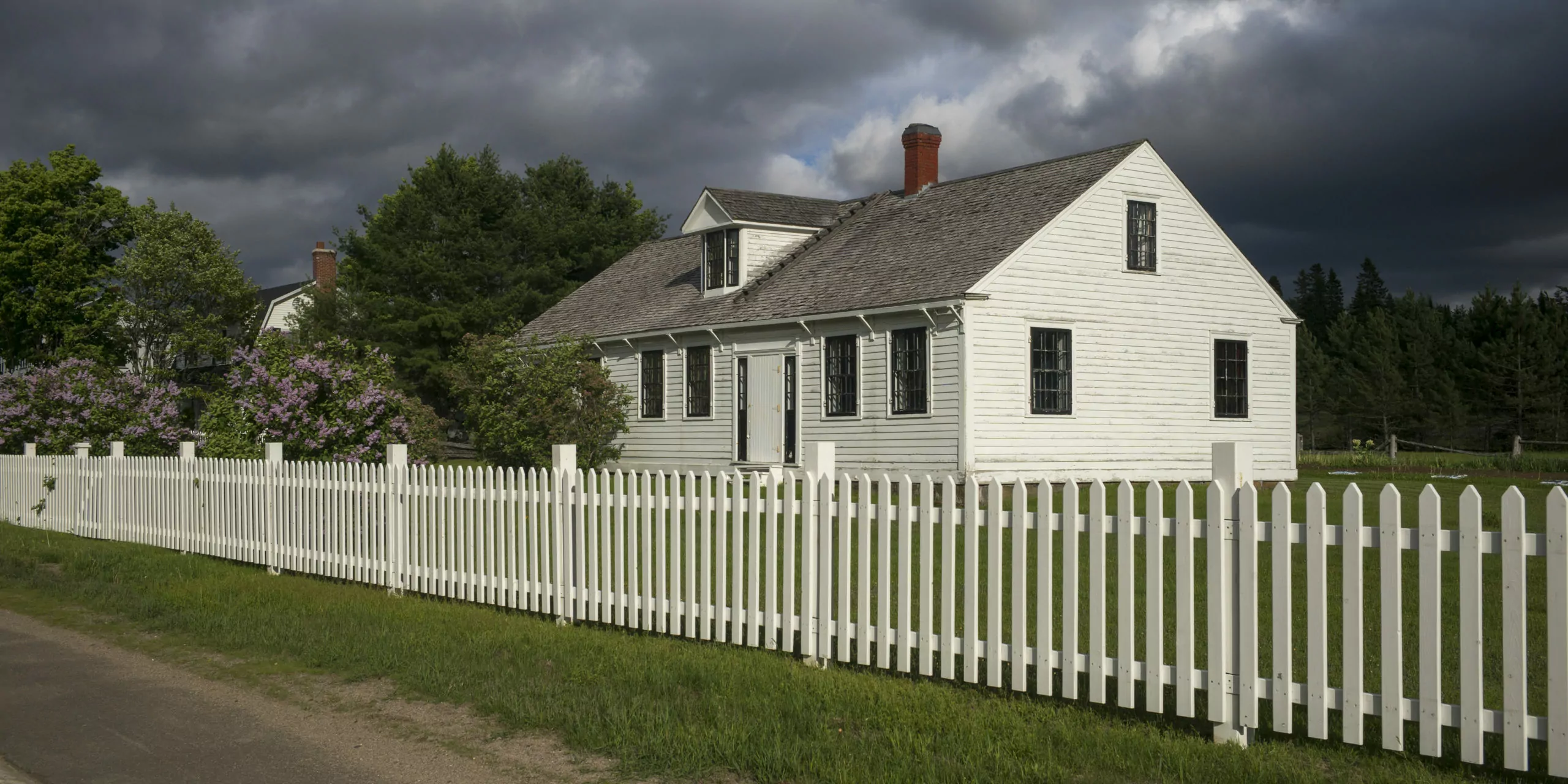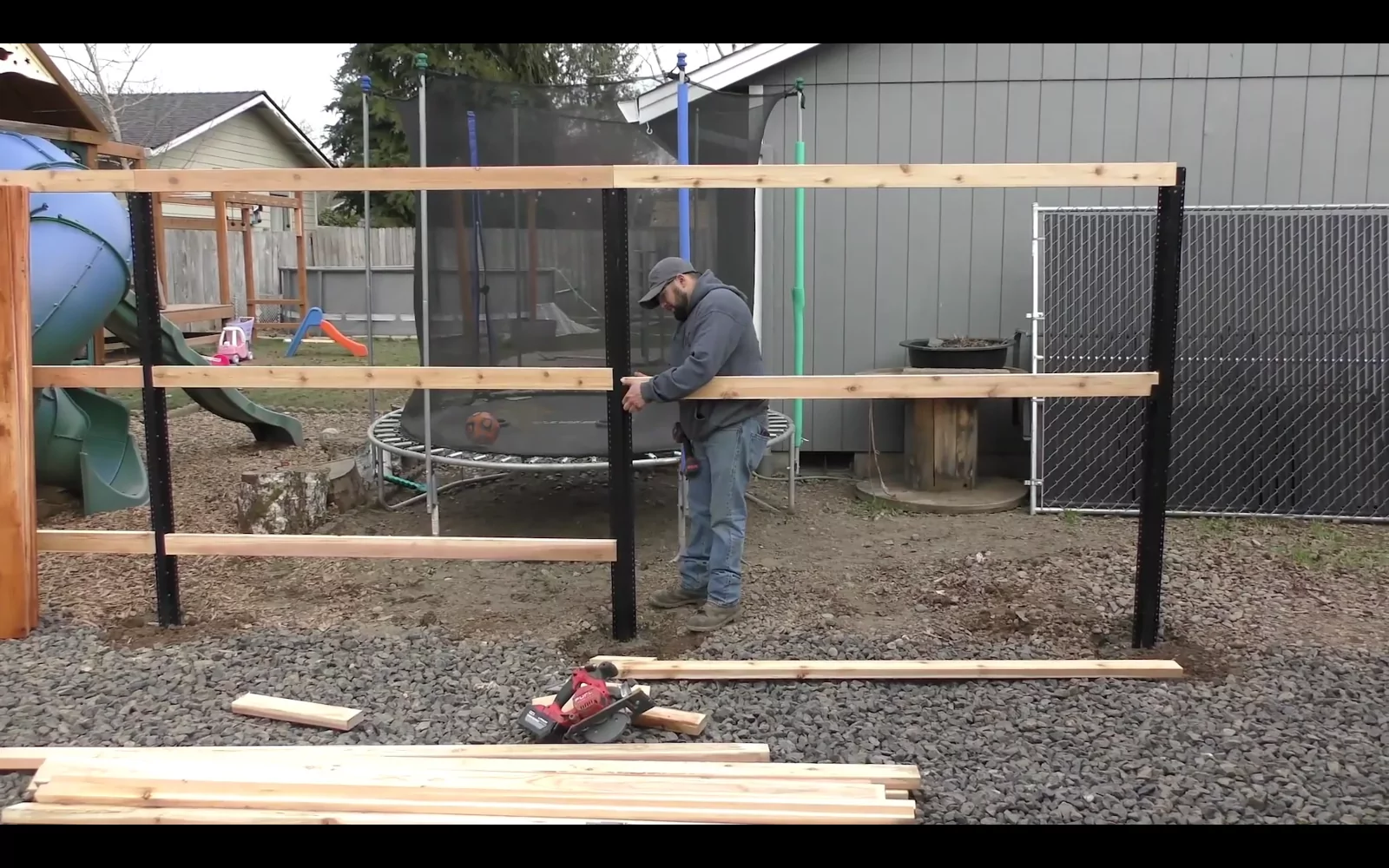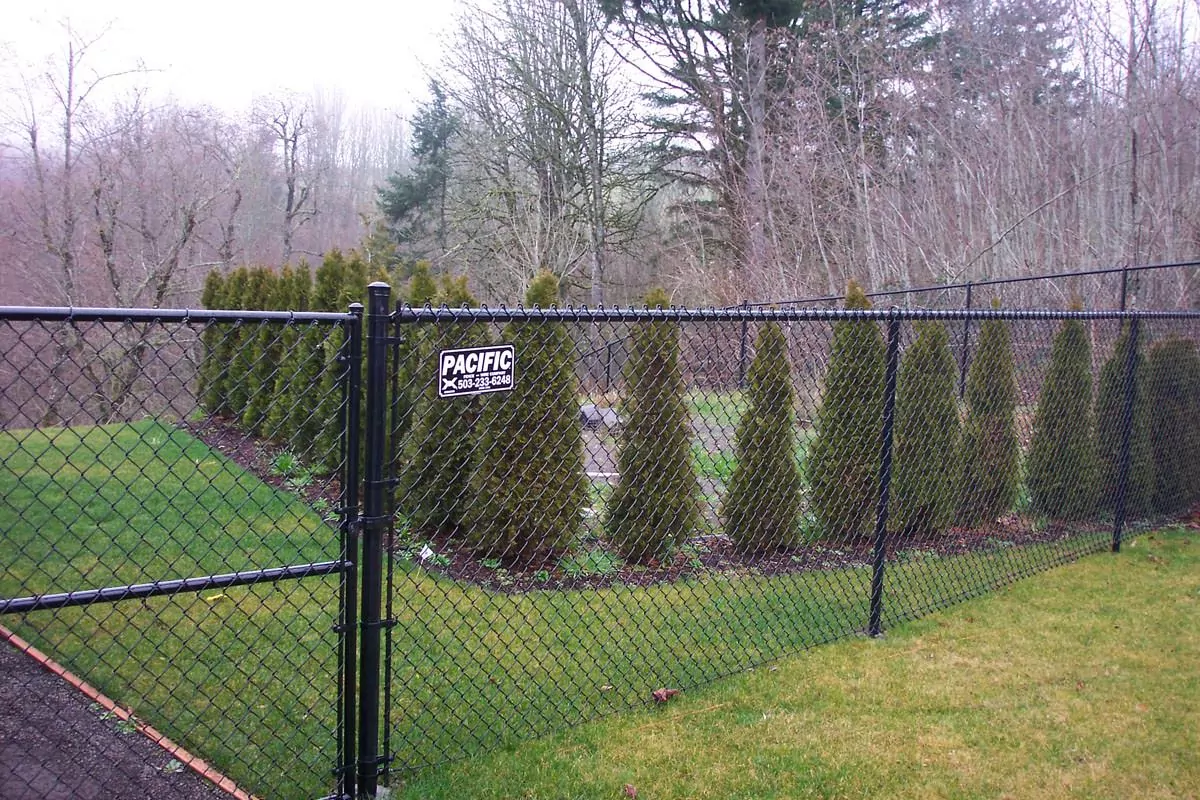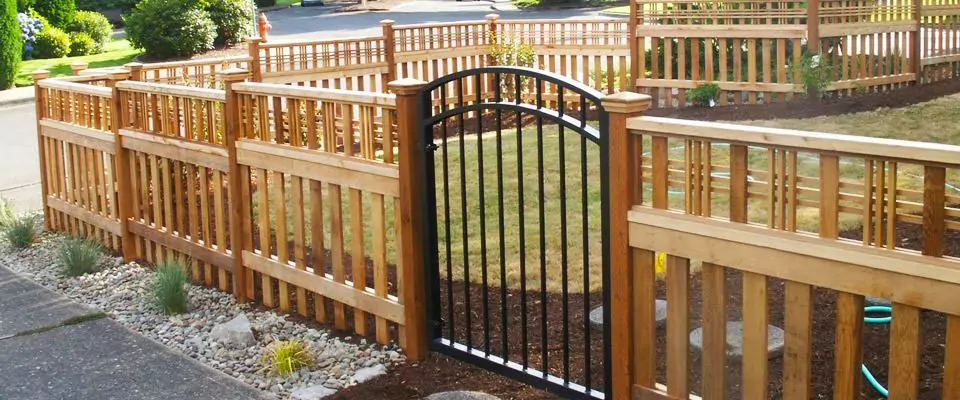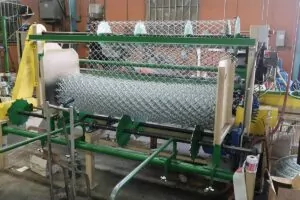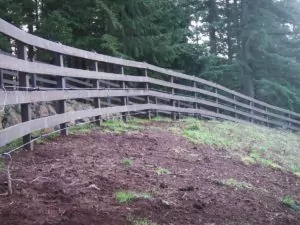We have a lot of clients talk to us about the different residential fencing options in Portland and beyond, and there are any number of reasons why they may need a new fence. They may want to upgrade the look of their property, a new build that hasn’t had a fence installed, or the old one is ready to fall over during the next big storm.
The first thing we do is figure out what kind of fence they need (security, privacy, aesthetic) and what kind of look and feel they’re going for. For example, a small bungalow may be looking for the traditional charm of a cedar fence white a stately manor wants the sophistication of a wrought iron metal fencing.
Or maybe there’s a need for a mixture of fencing, something that really improves the curb appeal at the front of a property with a back fence that keeps the family dog (and kids) safe and secure. And while it shouldn’t be the only concern, price will often play a part in the decision-making process.
Residential Fencing Options
The sky’s the limit when thinking about residential fencing options in Portland, both in materials and design. As far as fence materials, here are the most common options:
- Wood Fencing
- Vinyl Fencing
- Chain-Link Fencing
- Wrought Iron Fencing
- Composite Fencing
Wood Fencing
Wood fencing has a timeless appeal and versatility that can immediately spruce up your property’s aesthetics. Its natural look, which blends well with various landscapes and architectural styles in the Portland Metro area, offers a classic charm. Wood also allows for customization in terms of style and height, depending on your needs.
However, wood requires periodic upkeep such as staining, sealing, or painting to preserve its appearance and durability, which can incur additional costs and time. It also won’t last as long as some other materials. And while initial costs for wood fencing might be lower compared to some materials, it can be prone to rotting, warping, or termite damage over time.
Yet, wood’s natural appeal, adaptability, and the options for different looks remain strong selling points for many of our homeowners. With proper care, a wood fence can endure for years, but there is a commitment to maintenance to uphold its charm and structural integrity.
Metal fence posts can help stretch out the lifespan of a wooden fence, and a weathered look to the fence adds additional warmth. But there will still be replacement costs to think about in a decade or two.
Vinyl Fencing
Vinyl fencing offers compelling advantages for homeowners seeking a hassle-free, durable option. Its standout feature lies in its low-maintenance nature, eliminating the need for painting, staining, or sealing, saving considerable time and ongoing expenses. Vinyl fence panels can be made to look like wood, stone, and other materials too.
Its durability is impressive, resisting rot, decay, and pests, ensuring a long-lasting investment. Cleaning is a breeze—just an occasional wash with soap and water keeps it looking pristine. But you’ll pay a little more for less maintenance. The initial cost of vinyl fencing tends to be higher than some alternatives like wood.
While it’s durable, extreme temperatures can occasionally cause it to become brittle or expand, potentially leading to damage. Although it offers various styles and colors, customization options might be limited compared to wood or metal. And colors could fade after a few years in the summer sun, something to think about when choosing a color for your vinyl fence.
Yet, for homeowners seeking a fuss-free, resilient fencing solution that retains its appearance, vinyl is a top choice. Its longevity and minimal maintenance often justify the initial investment, making it an appealing option for those that need durability and easy upkeep.
Chain-Link Fencing
Chain link fencing has a few advantages for homeowners seeking a practical, budget-friendly option. Its primary allure lies in its affordability and low maintenance. It can be easy to install, which may save you on Installation costs, making it an accessible choice for those on a budget.
Additionally, chain link fences require minimal maintenance—occasional cleaning suffices to keep them in good shape, reducing ongoing upkeep expenses. There are also plastic coatings that give you the opportunity to really change the look of chain link with different colors.
However, chain link fencing might lack the privacy and aesthetics offered by other materials. Its see-through design provides little seclusion, which might not suit those prioritizing privacy (although spats can be added to provide added privacy. While it serves as a reliable barrier, it may not be the most secure option compared to solid fencing types.
Yet, for those valuing affordability, low maintenance, and a functional barrier without emphasizing privacy or looks, chain link fencing emerges as a solid choice. It suits various property types, serving its primary purpose effectively, though it’s essential to weigh its cost-effectiveness and minimal upkeep against its limitations in privacy and aesthetics.
Residential Fencing Options: Wrought Iron Fencing is a Classic Choice
Wrought iron fencing presents an array of benefits, both in form and function. With the right amount of maintenance, wrought iron will last for decades upon decades without losing its timeless elegance. It’s a long-term investment that withstands weather conditions and offers high resistance against wear and tear.
Beyond durability, wrought iron’s ornate designs and classic look add a touch of sophistication to any property, enhancing its aesthetic appeal. From the design of the bars to the finials atop each bar, you can really customize the fence to fit your personality.
But this type of fence will come at a price. The initial cost of wrought iron fencing tends to be higher compared to most other fence styles by the linear foot. Its weight and complexity can make installation more labor-intensive, potentially increasing upfront expenses. Maintenance is crucial to prevent rust–periodic painting or sealing helps preserve its appearance and stave off corrosion.
While wrought iron fences provide a high level of security and a prestigious appearance, their ornamental nature might limit privacy. The spaced bars don’t offer much seclusion, which could be a drawback for those prioritizing privacy in their outdoor spaces. Yet, for homeowners seeking a durable, elegant fencing solution that exudes sophistication and provides reliable security, wrought iron remains a top choice.
Composite Fencing
Composite fencing offers a compelling mix of advantages for homeowners seeking a durable, low-maintenance option. Its standout feature lies in its longevity, crafted from a blend of recycled plastics and wood fibers, making it resistant to rot, decay, and pests. This results in a long-lasting fencing solution that retains its appearance over time without the need for extensive upkeep.
The material also provides excellent weather resistance, enduring various climates without warping or fading, ensuring longevity. There are several options for design and color so you can get the look you want. While the initial cost might be higher compared to some materials, the long-term savings from reduced maintenance and longevity will help with long-term costs.
However, the weight of composite materials might make installation more labor-intensive, potentially increasing installation costs. Although it’s a durable option, extreme temperatures could cause expansion or contraction, necessitating proper installation techniques to take these effects into account.
Residential Fencing Options: What to Think About Before Installation
Although there’s a residential fence option for every taste, setting, and function, there are some things you should consider before the first post hole is dug. From getting the necessary permits to touching base with neighbors, these few steps will make the process that much easier.
Local Regulations
Fencing permits for fences make sure everything follows the rules, including how tall the fence can be, where it goes, and what materials to use. You don’t want to spend a bunch of money and time building a fence only to have to take it down. Permits also consider safety and property lines, preventing any issues between neighbors before the installation process even begins.
Neighborhood Guidelines
If you live in a neighborhood with a Homeowners Association (HOA), getting permission to build a fence is an absolute necessity. The HOA sets rules to keep the neighborhood looking good and maintaining a certain style, so make sure you know what the guidelines are. The HOA might have specific guidelines for materials, height, or design–much like what the permitting process does for the city.
Budget
Setting a budget before building a fence is crucial. It helps figure out how much you can spend on materials, labor, and any extra expenses. By planning your budget, you can choose the right materials and design that fit your finances. Understanding your budget helps make informed decisions, prevents surprises, and ensures a smooth fencing process without breaking the bank.
Neighbor Communication
Talking to your neighbors before building a fence in Portland is key to prevent misunderstandings. They might have opinions or concerns that could affect your plans, or they might need to secure pets in their backyard during the process. Plus, it might even lead to sharing costs (but don’t lead with that).
Landscaping and Utilities
Consider any underground utilities or nearby landscaping that might interfere with the installation. If you plan to install the fence where the existing fence is, you’re probably ok. But if there is no fence in place, it never hurts to check if there are any utility lines around that you could accidentally cut into.
From the classic suburban white picket fencing in the front yard to barbed wire fencing in a more rural setting, there are plenty of residential fencing options in the Portland Metro area and beyond. Pacific Fence and Wire has been helping people with their residential fencing options for more than a century, and we can help you get the fence that fits your home, your style, and your budget.


